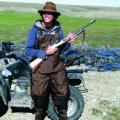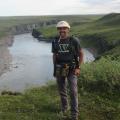Sedimentary Geology
Our research is focussed on all aspects of sedimentary geology, including basin analysis, process-oriented sedimentology, stratigraphy, sedimentary geochemistry, diagenesis, paleobiology, and the study mineralisation hosted in sedimentary rock, with special expertise in Precambrian sedimentary systems.
We cover both the spheres of carbonate and clastic sedimentology, with special expertise in Precambrian sedimentary systems. Our research is strongly field–based, predominantly in remote, understudied areas such as the Canadian Arctic, and central Africa; our collective boots-on-the-ground experience encompasses >35 years of remote field research.

Research related to carbonate, evaporite, and shale basins focusses on Proterozoic to lower Paleozoic systems in Nunavut, the Northwest Territories, and central Africa. Topics of particular interest include the tectonostratigraphic dynamics of whole basins through time, the physical, biological, and geochemical evolution of carbonate and evaporite paleoenvironments from the Mesoproterozoic to lower Paleozoic, and the deep-time evolution of reef systems and microbially-mediated carbonate microstructures.
Research in clastic sedimentology is motivated by questions such as: what were the shape and sedimentary dynamics of Precambrian sedimentary landscapes? Can they be compared, at least to some extent, to extra-terrestrial realms or modern deserts? These questions are addressed through analysis of Precambrian fluvial and aeolian rocks, which are magnificently exposed near our campus in Sudbury and throughout northern Canada. Field work in northern Canada is complemented by studies of sedimentary provenance, with a particular focus on the detrital-zircon geochronology. We also have a wide expertise on the remote-sensing-assisted analysis of modern sedimentary processes, which gives us a solid base for geomorphologic studies related to landscape change at scale of years or decades.

Research on sedimentary-rock-hosted ore districts and deposits includes (a) regional study of the factors controlling the spatial distribution of mineralisation in entire districts (stratigraphy, lithofacies, structure), and (b) study of ore-forming and diagenetic fluids, using a new in-situ microanalytical protocol developed at HES that allows characterisation of mineral-precipitating fluids at an unprecedented level of detail.
Sedimentology and Remote Sensing Lab
Surface processes such as weathering, erosion, and deposition have sculpted the face of the Earth for billions of years. Sediments and landforms are an extremely valuable archive to understand the past, the present, and the future of our planet. We are part of the Harquail School of Earth Sciences at Laurentian University, and we promote a novel integration between physical sedimentology, time-lapse remote sensing, and geophysical modelling.
Our favorite field sites are in the Canadian Arctic and the Great Basin of western USA. There, we conduct core research in the fields of Precambrian geology, Earth and planetary geomorphology, and watershed biogeochemistry. Student applications to join our lab are welcomed year-round.

Faculty & Research Scientists
-
Faculty
-
PhD Candidates
-
MSc Students
Additional Resources

















